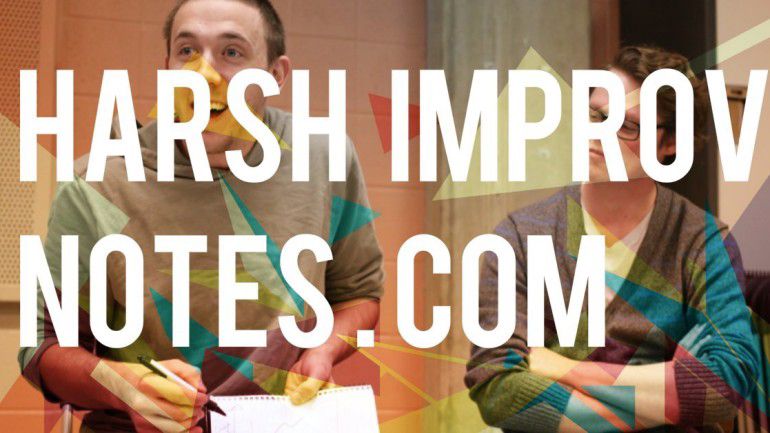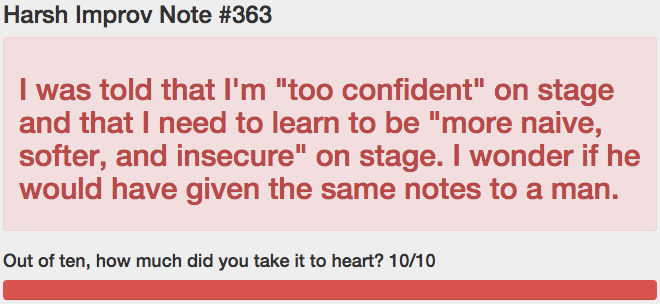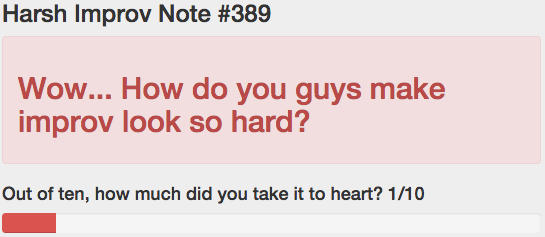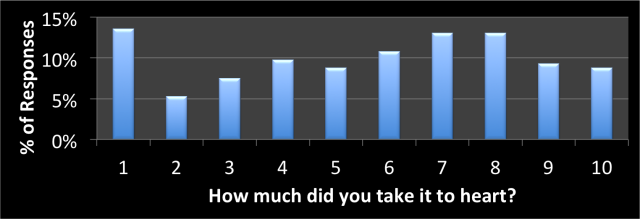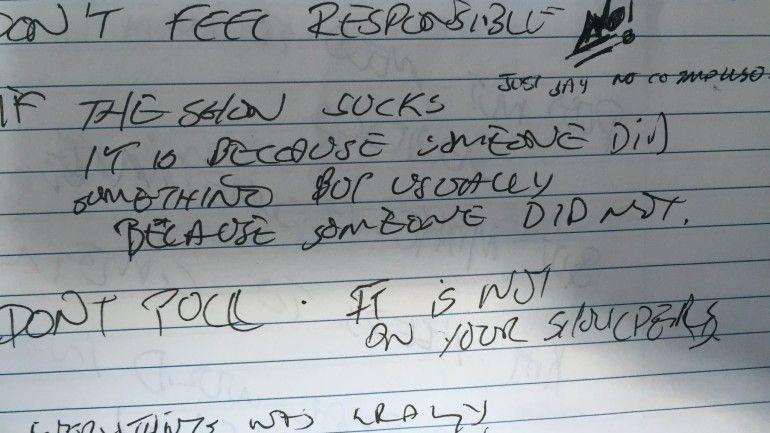Diving into HarshImprovNotes.com
Table of Contents
As of July 8th 2015 (only 5 days since it went online), HarshImprovNotes.com has over 400 submissions. That is 400 harsh improvisational theatre notes given. Granted some of those are mine, and granted some people submit more than 1, or 2, or 5, but the site has brought together a community of improvisers from around the globe to share something super-personal. To share a note that they have received somewhere along their training that they deemed harsh.
What makes a note _harsh? #
Perhaps it is a note given the wrong way, perhaps it was given by the wrong person, or at the wrong time. The harshness of a note can vary from person to person and moment to moment, so who am I to decide if a note is truly harsh or not.
Often times it would seem that the harshest notes, least taken to heart, are those that are completely out of context. Many of the notes on the site are racist, sexist or otherwise offensive.
Think for a moment that there are people in your company that have been given a note strictly based on things that they can not change about themselves. I find that so hurtful. Maybe you are someone who gave a note like that somewhere along the way, if that is true, in the words of Paul Blinov, “you need to check yourself”.
Why ask if it was taken to heart? #
Asking if the note was taken to heart sort of allows for the submitter to reflect on the note, and see how much it truly impacted them. There is a precious dichotomy between the serious, well-natured note and the submitted who doesn’t take it to heart. Similarly, there is something very curious about the harsh, offensive notes that are completely taken to heart.
It is interesting to look at the statistics of submissions on a large scale to see on average how much a harsh note was taken to heart. The scale is 1 - 10 (from ’not at all’ - ‘I think about it everyday’). The trend shows a wide variation around a mean of about 7.5 save for a huge spike at 1. What is this to mean? I call it the blue whale distribution.
Why does this exist? #
HarshImprovNotes.com stemmed from my compulsive note taking, collecting, collating and aggregating. I have been doing improvisational theatre for 10 years, starting with Rapid Fire Theatre in Edmonton, Alberta, Canada. Soon after my first soirée in improv, I started travelling the world performing, learning, and teaching improvisation. I love the opportunities to co-create, to share creativity, and improvisation provides that in such a raw manner that I have wholly embraced it as a life passion.
I have had many great, influential improv teachers, mentors, and peers in my life: Jacob Banigan, Patti Stiles, Chris Craddock, Kevin Gillese, Amy Shostak, Keith Johnstone, Dana Anderson, Donovan Workun, Alistair Cook, Becky Johnson, Graham Wagner, Kurt Smeaton, Joe Bill, Billy Tierny, Steve Sim, Lee White, and Craig Cackowski, Ken Campbell, Adam Meggido, Torsten Voller, Susan Messing, Matt Baram, Naomi Snieckus, Ron Pedersen, and the list goes on.
That being said, over my progression in this wonderful art form I have encountered many harsh instructors (not going to name names). These companions and instructors have given me notes which I have both discounted, and taken to heart. They have reached deep into the pit of my soul and vacuumed up all the confidence marbles. Each time this happened, I would write that note down. I would collect it. Save it. Write it down and think about it.
If the show sucks, it is because someone did something but usually because someone did not.
This collection soon turned into notebooks and notebooks of introspective improvisational ramblings, positive and negative. I needed a way to synthesize the good and the bad. I needed a cathartic release of the strain and pressure of saving these notes. In the same way you can’t keep love letters (or hate letters for that matter) forever, I wanted a means by which I could save the notes, de-personalize them after all these years, and open the discussion to the wider improvisation community. HarshImprovNotes.com does just that. It allows us to share what we have been harbouring, to hopefully move past that, into a realm of growth and development, together.
Would this work for other domains? #
I think part of the reason that the notes read so well are because I, and many others, appreciate the improvisers sense of humour. I presume that either or both the giver and receiver of the note have at least somewhat attuned comedic-sense, so the notes are often funny.
The idea of a similar collection of Harsh Teamwork Notes or Harsh Breakup Lines is somewhat more tragic in my mind. In improv, we are our own worst (and best) critics, but there is something to be said about the external director’s eyes which see the performer as a part of the show as a whole.
Final Thoughts #
I hope that this project makes me a better teacher and improv instructor. I hope that it makes us all more effective communicators. Improvisation is a young, transient art form. It is still developing modern masters. The vocabulary surrounding it is still forming (improv or impro? improvisor or improviser?), and I think that this allows for opportunities such as this: to look back on how we provide and receive feedback, and refine it such that it is more meaningful, more constructive, more supportive and generally less harsh.
Appendix: Demographics of Users on the Site #
Using Google Analytics gives you all sorts of amazing insights in to visitors on the site. Here are several charts that show the demographics of the visitors to HarshImprovNotes.com.
